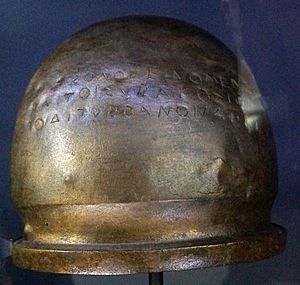Hiero I of Syracuse facts for kids
Hieron I (also known as Hiero) was an important ruler in ancient Sicily. He was the son of Deinomenes and the brother of Gelon. Hieron became the ruler, or tyrant, of Syracuse in Sicily in 478 BC. He ruled for about 11 years, until 467 BC. In ancient Greece, a "tyrant" was simply a ruler who took power, not always someone who was cruel. Hieron took over after his brother Gelon died.
Contents
Hieron I: Ruler of Syracuse

During his time as ruler, Hieron made Syracuse much more powerful. He moved people from cities like Naxos and Catania to Leontini. He then settled new people, called Dorians, in Catania and even renamed it Aetna. Hieron also made important alliances, like with Theron, the ruler of Acragas. He also supported the Locrians in their fight against Anaxilas, the ruler of Rhegium.
A Great Victory at Sea
One of Hieron's biggest achievements was a major naval battle. In 474 BC, his fleet defeated the Etruscans at the Battle of Cumae. This victory was very important because it protected the Greek people living in Campania (part of modern-day Italy) from being taken over by the Etruscans. To celebrate this win, a special bronze helmet was dedicated at Olympia. You can still see this helmet today in the British Museum.
A Patron of Arts and Sports
Hieron was known for supporting artists, writers, and thinkers. Famous poets like Simonides, Pindar, Bacchylides, and Aeschylus spent time at his court. The philosopher Xenophanes also visited him. Hieron was also very interested in sports. He often took part in the big Greek athletic contests, like the Olympic Games. He won several races, including single horse races and chariot races.
He won a chariot race at Delphi in 470 BC. This victory was so important that the famous poet Pindar wrote a poem about it. Hieron's greatest win was a chariot race at Olympia in 468 BC. Another poet, Bacchylides, wrote a special poem to celebrate this victory. Many other poems were written to honor Hieron's successes in sports.
The End of His Rule
Hieron I died in 467 BC in Catania (which he had renamed Aetna). He was buried there. However, his grave was later destroyed when the original people of Catania returned to their city. After Hieron's death, the rule of tyrants in Syracuse lasted only a short time longer.
See also
 In Spanish: Hierón I para niños
In Spanish: Hierón I para niños
 | Selma Burke |
 | Pauline Powell Burns |
 | Frederick J. Brown |
 | Robert Blackburn |

